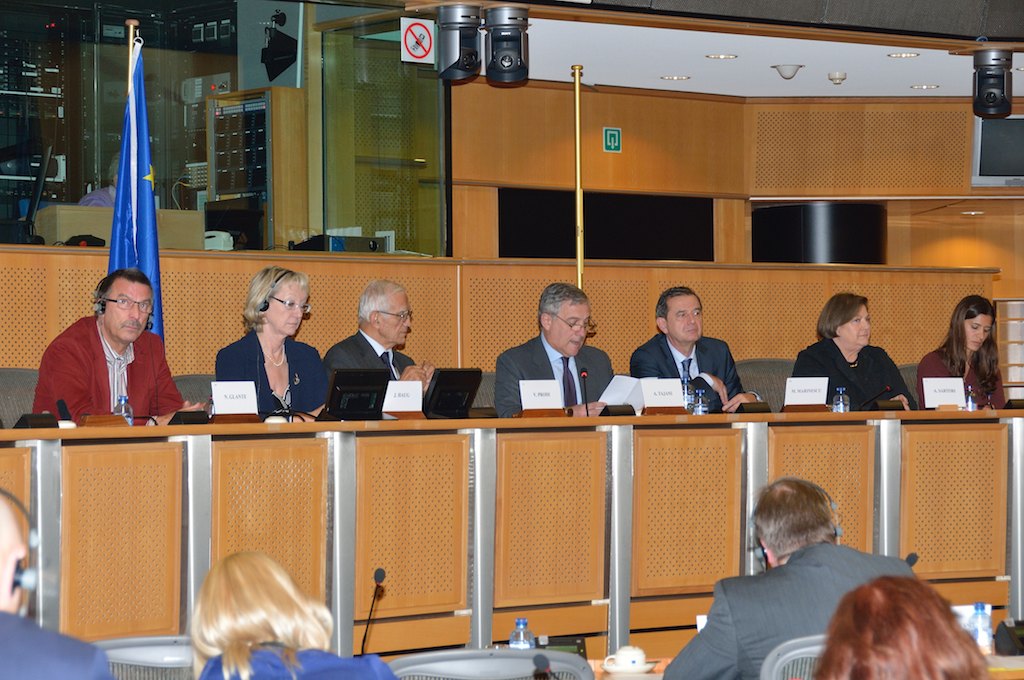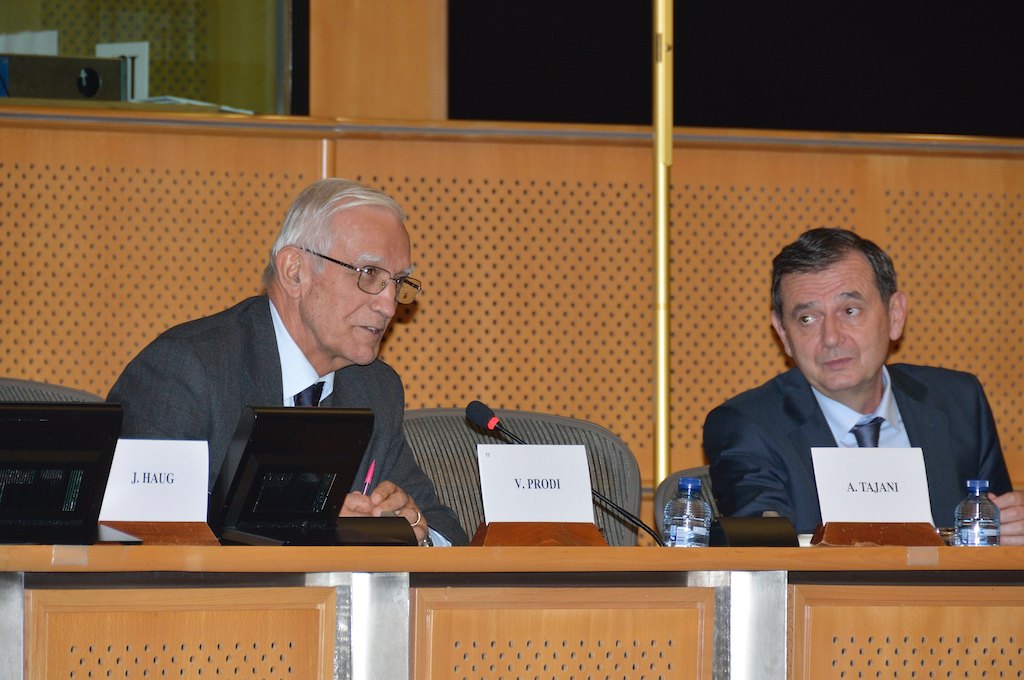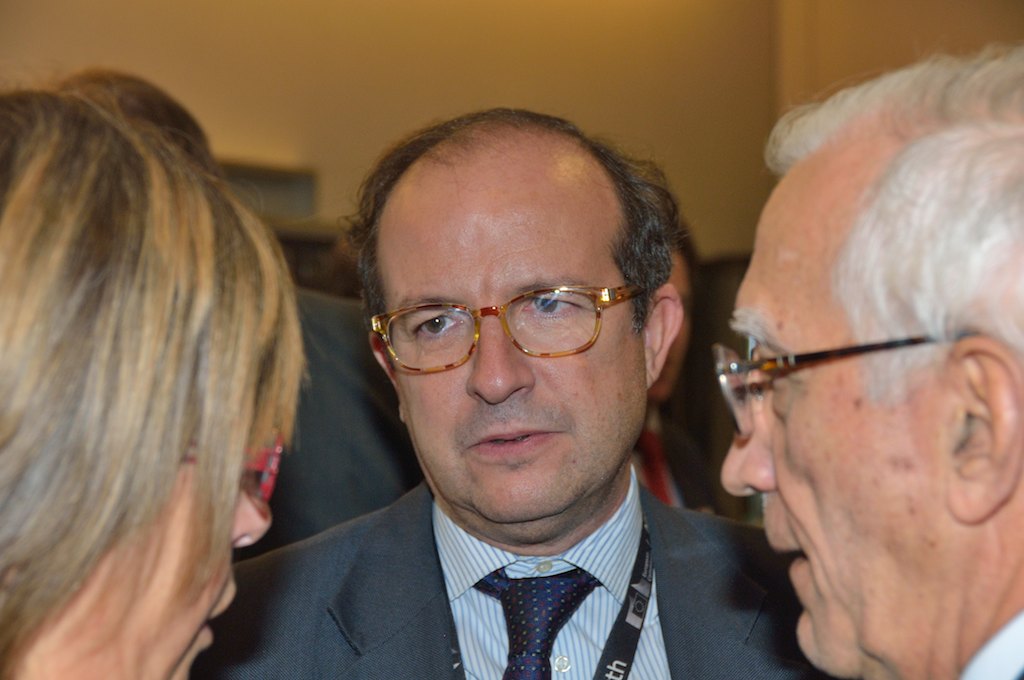A high-level debate on October 15 at the European Parliament in Brussels saw politicians giving the European GNSS Agency (GSA) a very positive review. The event marked the first anniversary of GSA’s move to its new headquarters in Prague and looked forward to a new operational phase as Galileo services come online to join EGNOS during 2014.
 Delegates to the Galileo 2.0 debate on the evening of 15 October were welcomed by Vittorio Prodi, MEP and chair of the Sky and Space Intergroup of the European Parliament. He said Galileo was “a true EU project.” Parliament understood the importance of the programme and the need for Europe to take advantage of the services that Galileo would provide.
Delegates to the Galileo 2.0 debate on the evening of 15 October were welcomed by Vittorio Prodi, MEP and chair of the Sky and Space Intergroup of the European Parliament. He said Galileo was “a true EU project.” Parliament understood the importance of the programme and the need for Europe to take advantage of the services that Galileo would provide.
Antonio Tajani, Vice-President of the European Commission, underlined the progress of the Galileo programme and the GSA. “Galileo is here and is moving forward,” he stated. “And it will provide services before the end of 2014.”
Mr Tajani observed that four satellites were already in orbit and ground stations had been established around the world. Already the positioning was exceptionally stable and very accurate. “The results so far are beyond our expectations and show the expertise of EU industry in this sector,” he said.
Operational service
 Carlo des Dorides, Executive Director of the GSA, said: “The event had been entitled Galileo 2.0 because we are on the eve of a new phase for Galileo: not on deployment but on providing service”
Carlo des Dorides, Executive Director of the GSA, said: “The event had been entitled Galileo 2.0 because we are on the eve of a new phase for Galileo: not on deployment but on providing service”
He highlighted two main areas for GSA work over the next few years: system security and market development. In terms of security two centres had been established (in France and the UK) and system security accreditation was on course. “We need to build new competences on the basis of what has been successfully achieved with EGNOS,” he said.
Jean-Jacques Dordain, Director General of the European Space Agency (ESA), emphasised the total commitment of ESA to ensuring the required quality of service for Galileo. He also praised the results already obtained by the system and predicted continual improvement.
“We will meet the requirements for Galileo early services as of 2014,” he promised. This will allow downstream manufacturers to test their equipment and enter the market with confidence.
Parliamentary views
 Amalia Sartori, MEP and Chair of the Industry and research (ITRE) committee emphasised that parliament had always supported EU space programmes as programmes for growth and jobs. “It was necessary to ensure that the whole economy benefits from this investment in space,” she said. She was confident of a very positive outcome.
Amalia Sartori, MEP and Chair of the Industry and research (ITRE) committee emphasised that parliament had always supported EU space programmes as programmes for growth and jobs. “It was necessary to ensure that the whole economy benefits from this investment in space,” she said. She was confident of a very positive outcome.
Marian-Jean Marinescu, MEP and member of the transport committee looked forward to the next phase of Galileo with the clear distribution of tasks between the European Commission, GSA and ESA. He stated: “Galileo is a good system but invisible [to the public] and requires applications on the ground to make use of it and raise awareness.” Fortunately a good budget was now available to help finance these developments. He foresaw GSA becoming the most important actor in this sector.
Norbet Glante, MEP and member of the ITRE committee also thought that Galileo was now on the right course but that “EU citizens need to be informed about the capabilities – given awareness and understanding.”
Jutta Haug, MEP and Vice-chair of the budgetary committee agreed that the European Parliament had always supported Galileo, EGNOS and the GSA and described the efforts of Parliament to ensure that the programme was adequately funded.
Mercedes Bresso, Vice-President of the EU’s Committee of the Regions called for support to enable the regions to be at the forefront for the implementation and use of Galileo. There was a need to “stimulate innovation and develop technology and fundamental knowledge to provide a driving force for the future,” she said. “We also need to build the right business confidence – especially for SMEs.”
The workshop was followed by a networking cocktail to inaugurate a short exhibition in the European Parliament on the work and achievements of the GSA.
Media note: This feature can be republished without charge provided the European GNSS Agency (GSA) is acknowledged as the source at the top or the bottom of the story. You must request permission before you use any of the photographs on the site. If you republish, we would be grateful if you could link back to the GSA website.